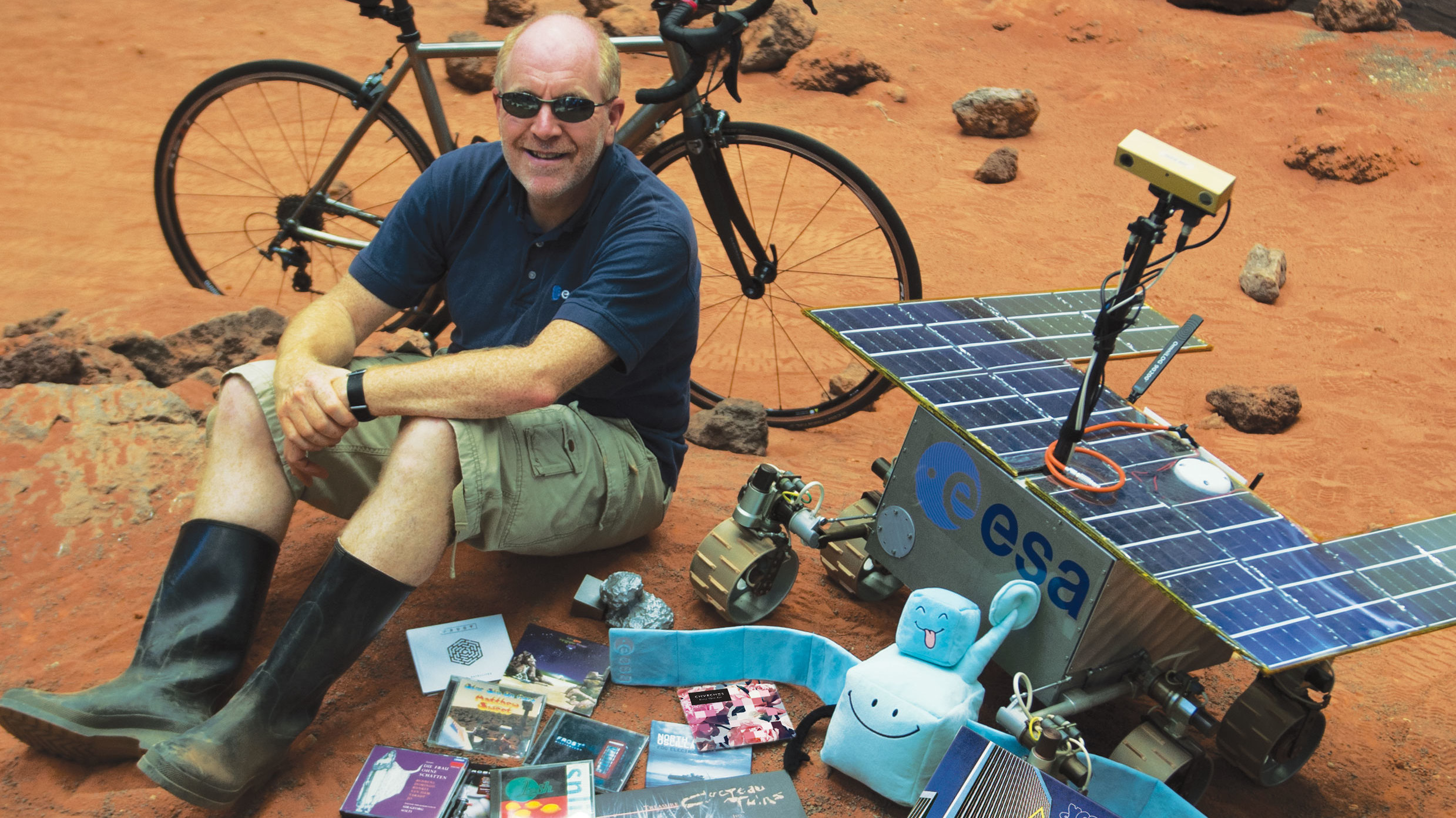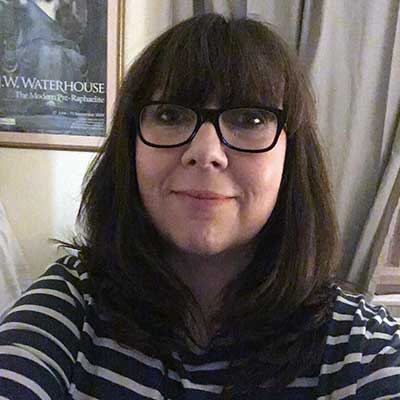“I was born in 1961 which was a great year for space exploration! We moved from Plymouth to Newcastle to Sussex, following my dad around for his job working for Rothmans cigarettes after he left the Navy, and ending up in a mansion house by the river in Buckingham, Oxfordshire.
I was into Top Of The Pops and chart stuff for years. I had a habit of taping whatever was No.1 off the radio each week using a little cassette recorder that my mum had for her teaching job. In 1973 my dad brought home a bunch of cassettes that he’d been given and one turned out to be Yes’ The Yes Album. I remember nights on end under the bed sheets listening to that on the cassette recorder. I had no connection with what was going on beyond the charts but I loved this album and had no sense of looking for much else to listen to until 1977, when we went on a school trip to North Wales. On the bus up there, one of my friends had a music mag with a two-page spread about Going For The One. I looked at that and thought, ‘It’s them, I know them!’ I didn’t know what else I’d missed out on, but I knew I needed to find a record shop – which I did, the very next week – and bought it, on red vinyl. That October Yes played at Wembley Empire Pool and I went down with a friend. That was my first ever rock gig, aged 16.
My second gig was Buzzcocks at Aylesbury Friars, which my younger brother Ian took me to. Punk was dangerous for middle class, locked-away-in-the-countryside boys. Halfway through the gig, Pete Shelley said, ‘If you lot don’t stop gobbing at us, we’re off!’ – cue gob overload. So there was punk and there was prog. My brother went punk, and got into art, and I went prog. Two years later at university in Edinburgh, I had the whole Yes back catalogue and was seeing a lot of gigs, and because of my location and the time, a new wave of bands like Orange Juice, TV21 and Aztec Camera were on my radar.
Prog goes places. If you don’t like where to, okay, but don’t fault it for trying.
In the halls of residence there was a record collection that anyone could borrow from. I’d bought a record player and a NAD 2020 amp – everyone got to know what the cheapest good stuff was – and classical music became a huge thing for me. I got into Mahler really quickly. He inhabits a world of turmoil in the 1820s and you can hear that. I’ve now travelled around the world to hear Mahler performed and I really get that symphonic link with prog. Once, I saw Mahler’s Eighth in Edinburgh’s Usher Hall. It was so massive and so emotionally draining, I’d closed my eyes during the performance and when it finished, the auditorium emptied and there was only me and another bloke left. We spoke to each other, saying, ‘It’s amazing that there are people in the world who will never hear that.’ Like classical music, prog goes places. If you don’t like where it’s going, okay, but don’t fault it for trying.
Punk was phrased as ‘rebelling’ but so was prog. In the wilderness of the 80s, it was a challenge to stay prog. But two bands I kept up with were Marillion and Pallas. I saw Marillion in Chamber Street Student Union in 1982, ’83. I’m standing in front of Fish as he sings Forgotten Sons – woah. I’d started editing the Alternative University Prospectus, then became a photographer and hooked up with the student newspaper and covered gigs and the Edinburgh Festival. I saw some really interesting bands: U2 in 1983 in the Playhouse, and Kajagoogoo – later they would become more interesting to me because of Nick Beggs.
Japan were hugely important to me – there was [David] Sylvian’s voice, [Richard] Barbieri’s keyboards and the rhythms on Tin Drum that were totally off the wall. But why the hell did I start listening to Duran Duran? Well, I did. And the first time I saw them live, they were supported by Talk Talk. Spirit Of Eden, Laughing Stock, Mark Hollis’ solo album… those are eternal to me. If you’re out there, Mark, we love you! The next time I saw Duran Duran they had The Church in support, who’d gobsmacked me and my mates when we saw them on The Old Grey Whistle Test. Their psychedelic jangle went down terribly with the audience, and they soon got kicked off the tour, but we booked them for a uni gig and got to see a little rock’n’roll behaviour after the show.
After uni, I moved to the US for five years, and then Europe, and got quite detached from what was happening in the UK. I listened to all the stuff I always listened to and I’d see Yes and Genesis in Washington or Germany. Radiohead became very big in my world. By this time there was the internet – I started listening to The European Perspective podcast on The Dividing Line, presented by The Amazing Wilf. That exposed me to a lot of things: Magenta, Big Big Train. People were telling me I was gonna really like a band called Frost*. I was about six months behind the curve but I got really hooked. I was now in Devon and driving up to London to see them play and getting to know people at the shows and on the Frost* forum. When you hear Milliontown for the first time, it’s awesome – Jem Godfrey is a songwriting genius, and I was delighted to use Saline [from Experiments In Mass Appeal] on a video of the Philae lander descending on comet 67P in 2014. It’s one of the things we get to do at the ESA, build relationships with musicians – Vangelis’ new album Rosetta came about after working with us.
The biggest gig of this year for me was Lush. When The Roundhouse show was announced, I had tickets within three minutes. It’s astral, spacey music and a soundscape as much as three-minute pop songs. It gets me, emotionally. But the biggest emotional connection I’ve had in years was recently at Chvrches at the Melkweg in Amsterdam with my 16-year-old daughter. I love Portishead and Cocteau Twins, that electro-pop thing. In the middle of Clearest Blue there was a break and the whole room just went nuts. It was primal, and what a figurehead Lauren Mayberry is. Yes, I’ve visited the Milky Way, it’s my local venue…
For me, music is all about that transcendent moment. I went to see Moon Safari at Kingston Peel and there was one moment when the spirit of music just opened up between them and the 150 of us watching. That’s what I’m searching for, to commune with music. But what impresses me, like seeing Frost* play the other night, is how can four people onstage pressing buttons and clunking things make you feel human in the most deeply spiritual way? We’re made of the same things that guitar string is made of, we’re made of the same water in that bottle onstage and yet four men, four women, an orchestra, can make transcendence happen.”
Find Mark on Twitter via @markmccaughrean, and follow the further feats of the European Space Agency via their official website.
- Meet the best turntables for your record collection
- Smaller budget? No problem! These are the best budget turntables

